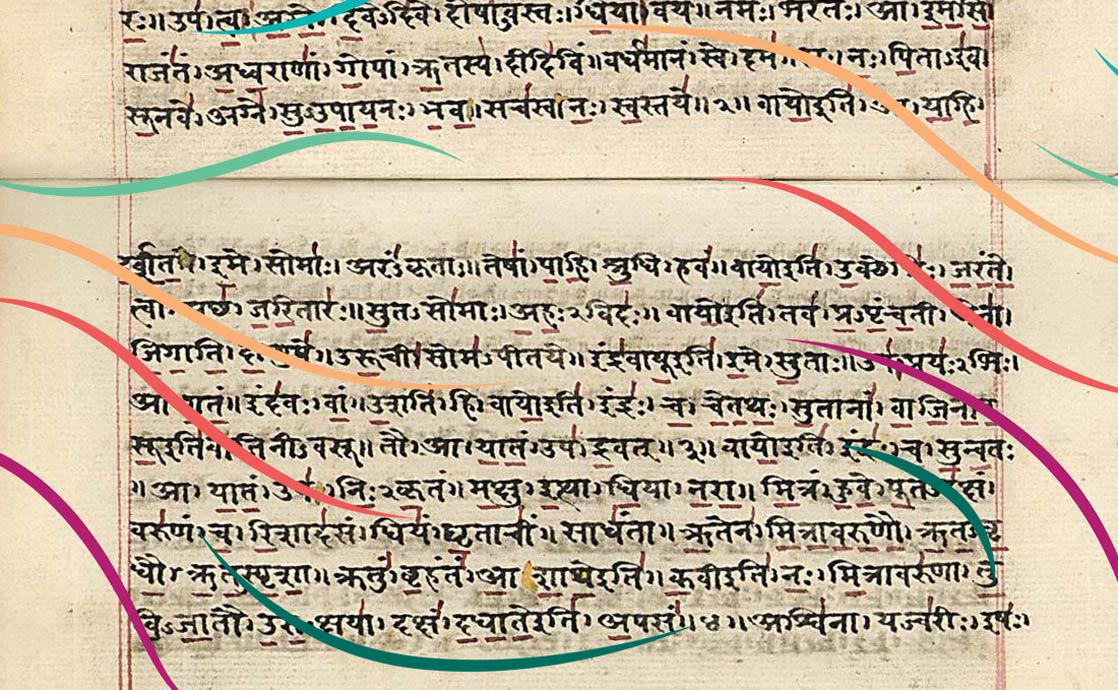The Rig Veda, a monumental antiquity of Indian scriptural heritage, unfolds as an intricate tapestry of spiritual reflection and philosophical inquiry. Its verses, thought to date back over three millennia, echo the intellectual fervor and cultural richness of the Vedic period. In the Bahá’í Faith, which reveres the unity of all world religions, the teachings of the Rig Veda provide profound insights into the nature of divinity, the cosmos, and the human experience. This exploration aims to elucidate the significance of the Rig Veda within the Bahá’í perspective, elucidating its metaphorical depth and inherent wisdom.
At its core, the Rig Veda encapsulates a fervent yearning for understanding, akin to a traveler traversing an expansive desert, seeking solace in the oasis of divine knowledge. Each hymn resonates with the universal quest for truth, inviting us to ponder the essence of existence and the interconnection of all life. For Bahá’ís, this intrinsic quest aligns seamlessly with the teachings of Bahá’u’lláh, who espoused the unity of all religious teachings, fostering a worldview wherein truth is multifaceted yet singular.
Within the enigmatic verses of the Rig Veda, one can discern profound metaphors that reflect the Bahá’í principles of unity and diversity. The concept of “Brahman,” an ineffable ultimate reality, resembles the Bahá’í understanding of God—an entity beyond comprehension, yet intimately connected to creation. Just as the Rig Veda articulates the oneness of all existence—“Ekam sat, vipra bahudha vadanti” (Truth is one; the wise call it by many names)—the Bahá’í teachings advocate for this very unity across different faith traditions, incessantly reminding us of the common spiritual heritage that binds humanity.
The Rig Veda also delves into the natural world, encapsulating an appreciation for the cosmos that resonates deeply with Bahá’í environmental teachings. The hymns often personify elements of nature, seeing divinity in streams, mountains, and the sacred air. This intrinsic reverence for the Earth culminates in a call for stewardship and harmony, mirroring the Bahá’í imperative of ecological responsibility. Such ecological sensibility serves as a reminder that humanity’s actions have profound implications for the planet, prompting spiritual reflections that extend beyond the self.
In the metaphorical landscape of the Rig Veda, the concept of sacrifice emerges as a recurring theme. The “Purusha Sukta” hymn introduces a cosmic being, Purusha, whose sacrifice leads to the creation of the universe. This allegorical act of selflessness resonates with Bahá’í tenets promoting the ideals of service and altruism. Just as Purusha’s sacrifice is central to creation, Bahá’ís emphasize the importance of self-sacrifice for the betterment of society and humanity, advocating for a life dedicated to the upliftment of others.
Furthermore, the philosophical discourses found in the Rig Veda contribute to understanding the concept of “Maya” or illusion, akin to the Bahá’í view of the material world as transient. The notions of detachment and spiritual awakening pervade both texts, guiding adherents toward a realization of the interconnectedness of all beings and the importance of transcending material concerns. This ideation manifests a call to embrace a higher purpose, one that prioritizes spiritual fulfillment over temporal gain.
Central to Bahá’í discourse is the principle of progressive revelation, which finds a parallel in the Rig Vedic understanding of divine communication. The Vedas assert that wisdom emanates from a divine source that evolves along with humanity’s understanding. Bahá’í teachings elucidate a continuum of prophets and messengers who have imparted spiritual teachings throughout history, each contributing to the sublime tapestry of divine guidance. This shared perspective on revelation strengthens the Bahá’í view of the interconnectedness of religious truths.
The allegorical nature of the Rig Veda invites readers not merely to interpret but to internalize its teachings, a practice that parallels the Bahá’í approach to scripture. Engaging with the hymns as living documents empowers individuals to extract timeless values relevant to contemporary life. As Bahá’ís engage with the Rig Veda, they are called to reflect on its exhortations towards integrity, compassion, and communal well-being, urging them to embody these principles in their daily praxis.
In conclusion, the Rig Veda, framed through a Bahá’í lens, emerges as a profound exploration of spirituality, philosophy, and ethics. Its timeless teachings resonate with the Bahá’í ethos, advocating for unity, environmental stewardship, self-sacrifice, and a transformative understanding of divine truth. As followers of diverse faiths navigate the complexities of existence, the Rig Veda serves not merely as an ancient scripture but as a beacon of enlightenment, urging us to delve deeper into the essence of life and the interconnectedness of all creation. It compels us to celebrate our shared spiritual heritage, illuminating the path toward a harmonious coexistence marked by understanding, compassion, and an unwavering quest for truth.
